Erika, Outlander tour U.S. to change the world

Erika Gilsdorf visited Duluth with her Mitsubishi Outlander and her tiny trailer, getting “too much content” on U.S. tour.
By John Gilbert
Erika Gilsdorf drove through Duluth and looked for the perfect parkings spot amid the downtown construction. It had to be big enough to house her 2021 Mitsubishi Outlander, and also the custom-built “tiny house” camping trailer she was pulling behind.
She found the perfect place, on 14th Av. E. and London Road, right near Leif Erickson Park. That meant after we were finished with our casual conversation, she had the opportunity to walk through and marvel at the magical array of hybrid roses unique to Duluth’s Rose Garden.
“I love Duluth,. and I’ve been coming here for a lot of years, but I’ve never seen this Rose Garden before,” Gilsdorf said. “I could stay in Duluth forever, but that’s my problem. Everywhere I go, I want to spend more time, but I always have to move on.”
Gilsdorf is on the third leg of her “What Fuels You” tour, a year-long solo adventure that has already taken her to the Pacific Northwest, down the West Coast from Seattle, through Oregon and California, then across Nevada, Arizona, Texas, the Rocky Mountains of Colorado, and Kansas. “That was Part 1,” she said. “Part 2 took me to Alabama, Florida and the Southeast. This is Part 3, the Midwest.”
That’s the familiar part for the Detroit Lakes, Minnesota, native and resident, who has made a career out of being involved with creating video packages for various sponsoring corporations, and for clients such as National Geographic, and others. But this is a different project, because she is also her own producer.
Part 4 will be the East Coast of the U.S., where she has just finished completing the first half of her odyssey, which she calls “20 states and 20,000 miles,” as a one-person creator, producer, film crew, and solo participant of her own adventure.
The idea came to her after her life had settled down, following a divorce, and with her 26-year-old son graduated from college and well on his way into adulthood in Portland, Ore. Maybe driven by restlessness, she decided to do her part to help change the world. A modest objective.
Gilsdorf has been independent enough to operate her own film production company, “South Shore Productions.” since 2001, named after the fact she used to live on South Shore Drive, which runs along the south short of Detroit Lake.
I didn’t know that there was a “Detroit Lake” in “Detroit Lakes.”
From that seemingly unusual base, she has traveled the world, normally with a film crew and staff, on ventures she has been able to entice sponsors to support, and generally with the idea of promoting lifestyles that are ecologically sound and can lead to helping the world be a better place to live.
“I’ve mostly done projects in Central America,” Gilsdorf said. “We’ve done various things in Honduras, but also Belize, and Guatamala. We also did a big project in the Western Balkans, trying to help people in rural areas improve their way of life so they could stay in their homes and live in a way to take pressure off the coast areas but not have to move to the city.”
This time, coming out of the pandemic, she thought of a new idea, to try to inspire people to get serious about helping appreciate and preserve the environment. Her idea was to live a minimal lifestyle that could show an alternative way to move forward.
A 32-foot motorhome was never in her plan. She contacted the American Lung Association for ideas on what auto manufacturer might be interested in a joint venture focused on reducing pollution and improving efficiency. Mitsubishi was suggested.
Mitsubishi is a Japanese conglomerate that built highly-efficient compact cars for several decades, but seemed to be headed for extinction just a few years ago. After stubbornly clinging to its diminishing market share, Mitsubishi’s basis of high technology and advanced electronics has led it to a comeback, slowly and steadily finding stability with an array of compact vehicles with high tech features.
The company hooked up Erika Gilsdorf with a new Outlander, a unique plug-in hybrid “PHEV” model that would tow a custom-built “tiny” trailer, light enough to easily weigh under a 1,500-pound towing capacity — light enough to tow and convenient enough to sleep in and maybe cook in on the road.
Networking with friends and relatives, she contacted an architect in Kansas. Taking cues from a company named TotalBoat, which specializes in making small, light boats out of fiberglass, “we worked out the details, and he agreed to build this trailer for me,” she said.
“I got some sponsorships for a generator unit to store power, and a small little fireplace, and a bed that has a slide-out table. I have solar panels on the roof, and they work so well to provide power that I can store the surplus for later use. It’s rare that I have to plug it in anywhere.”
This particular Outlander is a PHEV, a plug-in hybrid vehicle, which has electric motors to help power the wheels, working alone or complementing Mitsubishi’s 2.0-liter 4-cylinder engine in what is an innovative type of recharging hybrid. When she got the arrangements made with Mitsubishi and got her tiny trailer ready to go, she was off.
“I sold my house and hit the road to try to change the planet,” she said, condensing her plan to its most concise. “I enjoy talking to people wherever I go, and I want to engage people with good ideas and who think outside the box for how to live better lives.”
After her carefully planned trips, she returns to Detroit Lakes to put together the stories and videos.
“People can check out the project on Instagram and Facebook, on ‘WhatFuelsYou@USA.com.’ I’ll be sharing stories with leading climate-change activists, and just normal people who are trying to do the right thing for the environment.”
Growing up and living in Northern Minnesota is undoubtedly resp0nsible for much of Erika’s motivation.
“My whole life I’ve been a passionate wildlife-preservation person,” she said. “And I’m fascinated about things like how land is set aside for national places. I also see people who stand up to fracking, and how we’ve all got to do what we can to preserve the environment. There is so much information out there, and so many people have interesting ideas.
“My whole problem is that I always end up with too much content.”
Being based in Detroit Lakes makes it easy to make short journeys to places like Duluth, and the North Shore, and other home-state parts of her national tour to complement all she has learned from traveling to places like Ireland, the Balkans, and wherever.
She has a friendly, engaging personality and enjoys meeting and talking to people wherever she goes. With her Outlander lettered up with sponsoring groups like “CREST,” for the Center for Responsible Travel, and various other backers, she finds new friends everywhere.
“I had a great conversation when I got to Duluth, with some people at a gas station who wondered what I was doing with all this,” she said, “and I enjoy learning about every place I go from talking to people.”
With the Outlander being a plug-in hybrid, it will go farther on pure-electric power than a normal hybrid, and while not as pure as an all-electric vehicle, there is no “range anxiety” because the Outlander’s electric motors augment the gas engine, and the gas engine recharges the battery pack for the electric motors. That leaves her free to focus on her travels and new experiences.
“I loved the desert,” she said. “And right in the heart of Los Angeles, where they are restoring a river.
“I got depressed for a while, worrying about things like the rain-forests. I used to think you could teach people what has to be done by showing them what’s bad about how we’re living. But instead, I’ve shifted now, to trying to show what’s good about how we’re living, hoping that people might say, ‘I can do that.’ “
She knows her partnership with Mitsubishi is running its year-long course, and her connection with the Outlander has been trouble-free, but she can’t avoid thinking about what might be her next project. Maybe a new electric pickup truck with a camper on the back, or maybe something all-electric, like a small SUV.
It’s important to be able to show people that the future of pure-electric vehicles is coming, with their potential of pollution-free transportation, which inevitably can overcome concerns such as range-anxiety, so that may inspire her to try a pure EV for her next concept.
But for now, she’s just a very determined woman who has a Mitsubishi Outlander through December 31st, towing a private “tiny house” trailer, and making her way around the country, sharing and accumulating too-much content, which she, as her own producer, must condense to try to put environmental differences opn display.



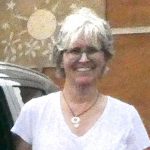
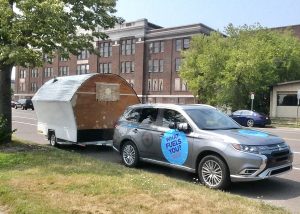
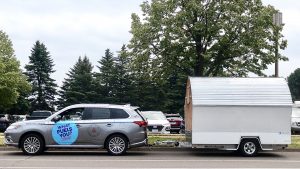
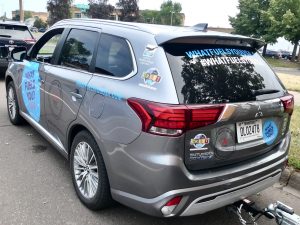
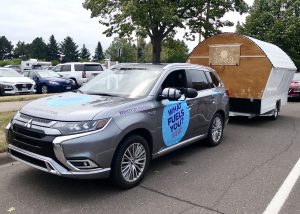
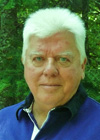 John Gilbert is a lifetime Minnesotan and career journalist, specializing in cars and sports during and since spending 30 years at the Minneapolis Tribune, now the Star Tribune. More recently, he has continued translating the high-tech world of autos and sharing his passionate insights as a freelance writer/photographer/broadcaster. A member of the prestigious North American Car and Truck of the Year jury since 1993. John can be heard Monday-Friday from 9-11am on 610 KDAL(www.kdal610.com) on the "John Gilbert Show," and writes a column in the Duluth Reader.
John Gilbert is a lifetime Minnesotan and career journalist, specializing in cars and sports during and since spending 30 years at the Minneapolis Tribune, now the Star Tribune. More recently, he has continued translating the high-tech world of autos and sharing his passionate insights as a freelance writer/photographer/broadcaster. A member of the prestigious North American Car and Truck of the Year jury since 1993. John can be heard Monday-Friday from 9-11am on 610 KDAL(www.kdal610.com) on the "John Gilbert Show," and writes a column in the Duluth Reader.